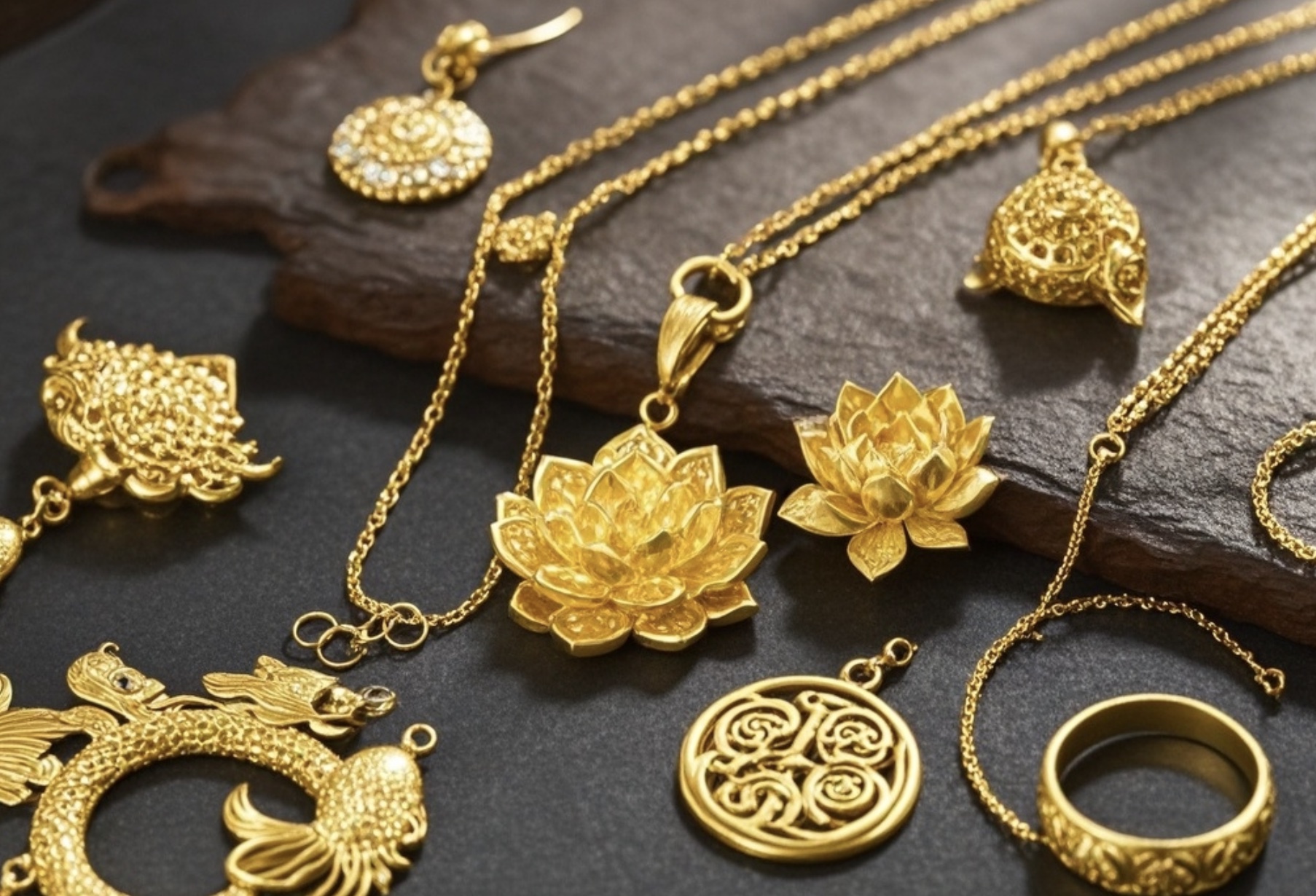China, with its rich history and thriving gold market, offers unique opportunities for travelers interested in buying gold. Whether you’re looking for investment pieces, cultural artifacts, or beautiful jewelry, this comprehensive guide will help you navigate the Chinese gold market with confidence.
Understanding Gold in Chinese Culture
Gold holds a special place in Chinese culture, symbolizing prosperity, good luck, and happiness. It’s commonly given as gifts during important life events such as weddings, birthdays, and business deals.
- Cultural significance: Red and gold are considered lucky colors in China
- Popular items: Gold bars, coins, and jewelry (especially 24K gold)
- Gifting tradition: Gold is a popular gift for special occasions
Types of Gold Available in China
1. Pure Gold (24K)
- Known as “足金” (Zu Jin) in Chinese
- 99.99% pure gold
- Soft and malleable, often used for investment pieces
2. 22K Gold
- Known as “K金” (K Jin) in Chinese
- 91.7% pure gold
- More durable than 24K, used in some jewelry
3. 18K Gold
- Also called “K金” (K Jin)
- 75% pure gold
- Popular for everyday jewelry due to its durability
4. Gold-Plated Items
- Known as “镀金” (Du Jin)
- Thin layer of gold over another metal
- Much cheaper but not considered real gold jewelry in China
Where to Buying Gold in China
1. Certified Gold Shops
- Look for the “中国金店” (Zhongguo Jindian) certification
- Reputable chains include Chow Tai Fook (周大福) and Lao Feng Xiang (老凤祥)
- Often found in shopping districts and malls
2. Department Stores
- Many have dedicated gold and jewelry sections
- Prices are usually fixed, reducing bargaining stress
3. Wholesale Markets
- Such as the Beijing Liulichang Cultural Street or Shanghai’s Yuyuan Bazaar
- Can offer better prices but require careful inspection and bargaining skills
4. Banks
- Major banks like Bank of China sell gold bars and coins
- Prices are based on current market rates
5. Airport Duty-Free Shops
- Convenient for last-minute purchases
- Prices may be higher than city shops
Tips for Buying Gold in China
1. Check for Authenticity
- Look for the “999” or “999.9” stamp on pure gold items
- Reputable shops will provide certificates of authenticity
2. Understand Pricing
- Gold prices in China are typically quoted in grams
- Current rates are displayed in shops, updated regularly
- Be aware of the workmanship fee added to jewelry pieces
3. Know the Return Policy
- Many shops offer a buyback service
- Understand the terms and potential fees before purchasing
4. Consider Tax Refunds
- Tourists may be eligible for tax refunds on large purchases
- Keep your receipts and check refund procedures at the airport
5. Bargain Wisely
- Bargaining is expected in markets but not in high-end shops or banks
- Start at 70-80% of the asking price in markets
6. Timing Your Purchase
- Gold prices fluctuate daily
- Consider checking prices over a few days before making a large purchase
7. Be Aware of Customs Regulations
- Check your home country’s customs rules regarding gold imports
- You may need to declare large purchases
Popular Gold Items for Travelers
- Gold Pandas: Official gold bullion coins, new design each year
- Gold Bars: Available in various weights, popular for investment
- Jewelry: Necklaces, bracelets, and rings in traditional Chinese designs
- Zodiac Figurines: Gold figurines of the Chinese zodiac animals
- Buddhist Pendants: Popular religious symbols in gold
Best Cities for Buying Gold in China
1. Shanghai: Known for its variety and competitive prices
Shanghai, as China’s financial hub, offers a wide range of gold shopping experiences from high-end boutiques to traditional markets.
- Nanjing Road: This famous shopping street is home to several reputable gold shops.
- Lao Fengxiang (老凤祥): One of China’s oldest gold brands, known for quality and traditional designs.
- Shanghai First Asia Jewelry Plaza: A multi-story building dedicated to jewelry and gold.
- Yuyuan Bazaar: Located in the Old City, this area offers a more traditional shopping experience.
- Lao Miao Jewelry (老庙黄金): Known for its intricate designs and competitive prices.
- Shanghai New World City: A modern shopping mall with several high-end gold and jewelry shops.
- Chow Tai Fook (周大福): A renowned Hong Kong brand with a wide selection of gold items.
- Shanghai Gold Exchange: While not open to retail customers, it sets the benchmark for gold prices in the city.
2. Beijing: Great for traditional designs and cultural pieces
Beijing, the capital city, is an excellent place to find gold items with strong cultural significance and traditional Chinese designs.
- Wangfujing Street: A prime shopping area with several gold and jewelry stores.
- Caibai Jewelry (菜百首饰): One of Beijing’s most famous gold retailers, known for traditional designs.
- Gongmei Tower: A multi-story building specializing in gold, jade, and other precious stones.
- Qianmen Street: A historic shopping street with a mix of modern and traditional stores.
- Beijing Yinlou (北京银楼): Specializes in silver but also offers gold items with unique Beijing characteristics.
- Liulichang Cultural Street: Known for antiques and cultural items, including gold artifacts.
- Several small shops offering unique, culturally significant gold pieces.
- China Gold Coin Incorporation: The official distributor of gold and silver commemorative coins issued by the People’s Bank of China.
3. Shenzhen: Close to Hong Kong, known for jewelry manufacturing
Shenzhen, as a major manufacturing hub for jewelry, offers great variety and often lower prices due to its proximity to production centers.
- Shuibei International Jewelry Trade Center: One of the largest jewelry wholesale markets in China.
- Hundreds of shops offering a wide range of gold products.
- Popular among both wholesalers and retail customers.
- Luohu Commercial City: A famous shopping center known for jewelry and watches.
- Multiple floors dedicated to gold and jewelry shops.
- Be prepared to bargain and verify authenticity.
- Tianxing Jewelry City: Another large jewelry market with competitive prices.
- Known for its variety of gold jewelry designs.
- Mix City Shopping Mall: For those preferring a more upscale shopping experience.
- Houses several high-end gold and jewelry boutiques.
4. Guangzhou: Home to many wholesale markets
Guangzhou, a major trading hub, is famous for its wholesale markets, including those for gold and jewelry.
- Guangzhou Jewelry Trade Center: One of the largest jewelry wholesale markets in South China.
- Offers a vast selection of gold items at competitive prices.
- Popular among both local and international buyers.
- Onelink International Plaza: A large complex dedicated to jewelry and fashion accessories.
- Multiple floors of gold and jewelry shops.
- Caters to both wholesale and retail customers.
- Beijing Road Pedestrian Street: A popular shopping area with several gold shops.
- Luk Fook Jewelry (六福珠宝): A well-known Hong Kong brand with a strong presence here.
- Zhuangjin Road: Known as “Guangzhou’s Gold Street”.
- Lined with numerous gold and jewelry shops.
- Good place for comparing prices and designs.
When shopping in these locations, remember the tips mentioned earlier in the guide:
- Always verify the authenticity and purity of the gold.
- Compare prices across different shops.
- Be aware of the current gold price to ensure you’re getting a fair deal.
- For wholesale markets, bargaining is often expected.
- Keep your receipts, especially for tax refund purposes if you’re a tourist.
By exploring these specific locations in each city, you’ll have access to a wide range of gold products, from traditional designs to modern pieces, and from individual retailers to large wholesale markets. Each city offers a unique shopping experience, reflecting its own character and place in China’s gold market.
FAQs
1.Q: Is gold cheaper in China compared to other countries?
A: Gold prices in China are generally competitive but can fluctuate. Always compare with international prices before making a purchase.
2.Q: Can I use credit cards to buy gold in China?
A: Many large retailers and banks accept credit cards, but some smaller shops or markets may prefer cash. Always check payment methods in advance.
3.Q: How can I ensure the gold I’m buying is authentic?
A: Purchase from reputable dealers, look for proper certifications, and check for the correct purity stamps (e.g., 999 for 24K gold).
4.Q: Are there any restrictions on taking gold out of China?
A: There are no specific restrictions on exporting gold from China, but you should declare significant purchases at customs. Check your home country’s import regulations as well.
5.Q: What’s the best time of year to buy gold in China?
A: Gold prices fluctuate based on global markets rather than seasons. However, some shops may offer discounts during major Chinese holidays like Chinese New Year or National Day.
6.Q: Can I get a tax refund on gold purchases in China?
A: Yes, tourists may be eligible for tax refunds on purchases over a certain amount. Keep your receipts and check the procedures at your departure airport.
7.Q: Is it safe to buy gold from street vendors or small shops?
A: It’s generally safer to buy from established, certified shops. Street vendors may offer lower prices but there’s a higher risk of purchasing fake or low-quality gold.
Conclusion
Buying gold in China can be an exciting and rewarding experience for travelers. With its unique designs, cultural significance, and competitive prices, Chinese gold offers something special for both investors and souvenir hunters. By understanding the market, knowing what to look for, and shopping wisely, you can make a purchase that you’ll treasure for years to come.
Remember, whether you’re buying a small pendant as a memento or making a significant investment, the key is to do your research, shop from reputable sources, and enjoy the process of finding that perfect piece of Chinese gold. Happy shopping!
Related
1.144-hour-Visa-Free Transit policies for Foreign Nationals – A Complete Guide in 2024
2.Travel to China: Precautions on Carrying Items for International Passengers in 2024


Hi there! This post couldn’t be written any better! Reading through this post reminds me of my previous room mate! He always kept talking about this. I will forward this article to him. Pretty sure he will have a good read. Thank you for sharing!